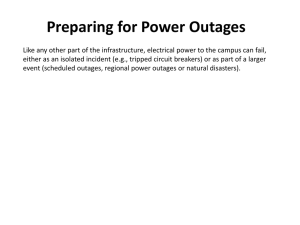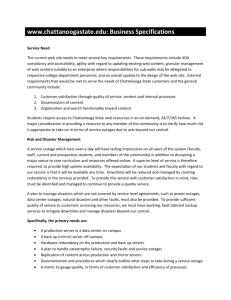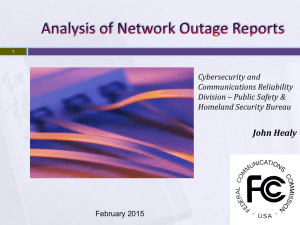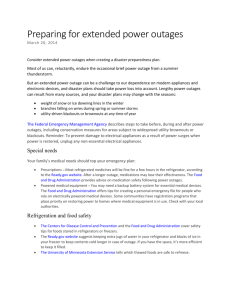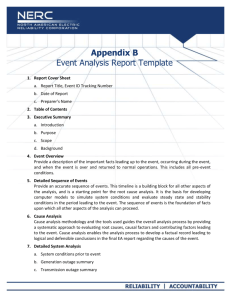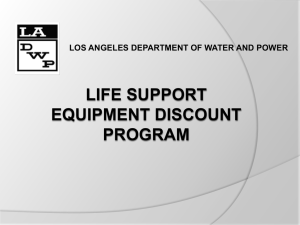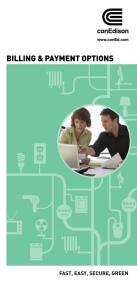Power Problems? Let Us Know!
advertisement
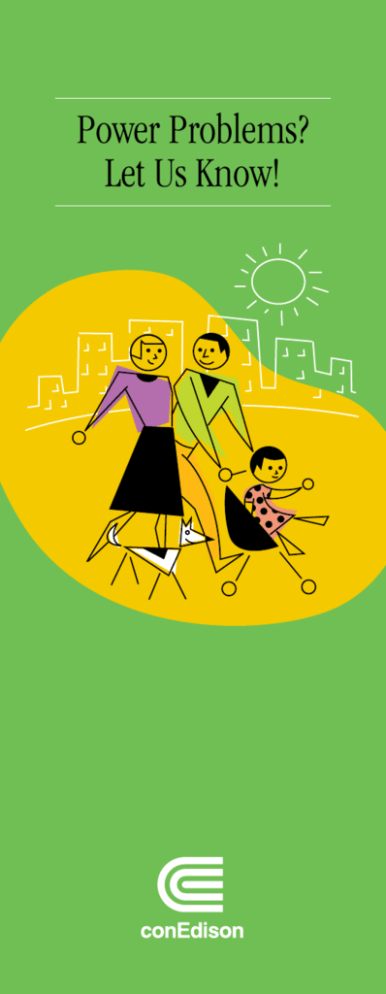
Power Problems? Let Us Know! Power Proble ms? Contac t Us! by phone: 1-800-75-CONED, 1-800-752-6633 through the Web: www.conEd.com If you have power problems, please contact us right away C on Edison is committed to providing the reliable service you expect and deserve. While we do our best to prevent power outages and other power problems, we want you to be prepared in case they do occur. If you lose power or experience dim, partial, or flickering lights, we need to hear from you right away. Please contact us immediately by calling 1-800-75-CONED (1-800-752-6633) or going to our Web site at www.conEd.com. You’ll help us determine the location and extent of a problem so we can send repair crews and restore your power as safely and quickly as possible. We need you to let us know if you see a hazardous condition, such as fallen electric wires or trees leaning against wires or poles. If you do, please keep your distance. Contact us even if you think your neighbor or someone else has already reported the problem. We are ready for your call or Web site report 24 hours a day, seven days a week. If you see a smoking manhole or a manhole fire, you should call 911. What causes power outages and other power problems? B ad weather is the most common reason for power outages. Traffic and construction accidents and animals also can damage electric equipment and interrupt power. High winds, soaking rain, heavy snow, and thick ice can uproot trees and break off tree limbs. Fallen trees and limbs can knock down overhead lines and poles and cause an outage. Lightning also can strike electric equipment or trees, which can disrupt power. Hot weather by itself does not cause outages, but long periods of extreme heat increase the use of air conditioning, which increases the overall demand for power. More power is used during heat waves than at any other time of year. Several days in a row of high demand during a heat wave create stress on and can overload electric equipment. Overloaded equipment can overheat and sometimes fail, which can cause dim or flickering lights or other power problems and outages. When demand is very high, we may ask you to reduce the amount of electricity you’re using to help reduce stress on the system. What should you do when your power goes out? F irst, reset breakers or replace burned-out fuses. If breakers are on and fuses are OK, contact Con Edison to report the problem. If your neighbors or others are without power, contact Con Edison right away so we can send crews to fix the problem as quickly and safely as possible. When you contact us, either by phone or through the Web, have the following information handy: n Your name, address, telephone number, and Con Edison account number, if you have one. Please make sure we have your current home and cell phone numbers on file. n The exact location of any hazardous conditions, such as downed wires, broken or leaning utility poles, or trees leaning against poles or wires. (But, please keep your distance from any hazardous conditions.) n The names and addresses of those you know who use electricity-operated life-sustaining equipment. When you contact us by phone, use our automated system to report a power problem. This system can identify your account by the caller ID of your home phone or cell phone number, if it is on record. If we need additional information, you will be transferred to a representative. If you have trouble reaching us, keep trying. Telephone wires may be damaged by a storm and, when large numbers of customers call to report power outages, telephone systems can become overloaded. After reporting the power problem to us, please allow reasonable time before contacting us again so our representatives will be available for other customers. We will keep you up to date. An estimate about when your service will be restored will be available at www.conEd.com. If you reported your problem by phone, we will call you with this information. We also will call you when your service is restored. Follow these steps to protect you, your family, and your property during a power problem or outage: n Tune your battery-operated radio to local stations for updates about service restoration in your area. n Use flashlights rather than candles or gas lanterns to minimize the risk of fire. n Check on friends or neighbors who are elderly, disabled, or who have special needs. Remember that elevators may not operate during an outage. n If you’re using dry ice, be careful. Handle it with gloves. For best results, place dry ice below the items you want to keep cool in an insulated container. n Turn off light switches and unplug appliances to prevent damage to the appliances when service is restored. Leave only a single lamp or radio turned on so you’ll know when power’s been restored. Then turn on lights and reconnect appliances one at a time. n Keep refrigerator and freezer doors closed as much as possible. Food will stay frozen for 24 to 48 hours with the doors closed. n Do not go near downed power lines. n Never use charcoal or gas grills indoors because they can cause a buildup of deadly carbon monoxide. n Use emergency generators safely. Portable generators designed to supply electricity to homes or businesses during a power outage can be extremely dangerous if not used properly. Contact a licensed electrician before connecting an emergency generator. For information regarding use and installation of emergency generation equipment, your licensed electrical contractor can call us at 1-800-75-CONED (1-800-752-6633) and ask to speak to our Energy Services department. What Con Edison does to restore your power W hen severe weather or a heat wave is predicted, we plan ahead to make sure we can restore any service interruptions as quickly and efficiently as possible. We position repair crews and supplies near areas prone to the greatest damage and prepare for increased telephone calls. When you experience a power outage, everyone’s safety is our highest priority. When we see a dangerous situation, we assign workers to protect the area. These employees are there to keep you safe, and may not have information about when your service will be restored. We work to restore your power as quickly as possible. First we must clear the area of downed lines, trees, and other debris. We then assess the damage to the system to determine the extent of the problem, and assign crews and equipment to the area to begin repairs. Unfortunately, repairing damage caused by major storms sometimes takes time, and it may be difficult for us to tell you exactly when your service will be restored. In the event of a hurricane, recovery time could take days or weeks. We ask for your understanding and cooperation, and assure you that service will be restored as quickly as possible. We first repair the power lines, transformers, or connections that caused the problem so we can restore power to critical facilities and customers who depend on life-sustaining equipment. Critical facilities include hospitals, nursing homes, police and fire stations, and public transportation. We then restore power to the lines and equipment that will bring back the most people in the fewest hours possible. As soon as we can, we restore all other customers who have lost power. Even if you don’t see crews in your immediate area, we may be working to restore service in other ways. Your service may be interrupted because of storm damage to lines and equipment located miles away from you that feed power to streets in your neighborhood. What you should do before a storm I f a major storm or hurricane is anticipated in your area, listen to radio and TV announcements for important advisories. Also, take these precautions: n Keep a supply of drinking water and nonperishable foods on hand. n Turn your refrigerator and freezer to a colder setting. If you lose power, they will stay cooler for a longer period. n Fill spare containers with water for cooking and washing. n Keep a landline phone in your home. Cordless phones will not work during a power outage. Ask your telephone service provider how a power outage might affect your service. n Use surge protectors to protect sensitive equipment, such as computers and flat screen TVs. Follow the manufacturer’s safety instructions. Also, consider using battery backup systems to protect against sudden loss of computer data. n Fully charge your cell phone. n Have battery-operated flashlights and a portable radio handy with extra, fresh batteries. n Fill your car’s gas tank. n Customers who depend on life-sustaining equipment should have an alternate source of electric power, such as a battery backup system, on hand. If you or someone you know uses lifesustaining equipment, let us know by calling 1-800-75-CONED. How to file claims for losses A fter an extended period without power, you may be eligible for reimbursement for certain losses: n Residential customers may file claims for spoiled food and medicine. n Commercial customers may file claims for perishable merchandise. Claims will be considered if the losses resulted from a failure of the local distribution system (equipment and wires that deliver electricity from a distribution substation to you) that lasted for 12 hours or more within a 24-hour period. Losses for damage to motors, equipment, or appliances are not reimbursable. Regrettably, claims for losses from power outages caused by conditions beyond our control, such as storms, floods, vandalism, strikes, or fires, cannot be honored. To file a claim, either fill out a claim form or write a letter within 30 days of the power outage. Claim forms and instructions are available on our Web site at www.conEd.com. For all claims, please include your name, address, and your Con Edison account number (if you have one) to assist us in processing your claim. A Con Edison account number is not necessary for reimbursement. You can send claims to us by mail, fax, or e-mail. mail: Con Edison Claims Department P.O. Box 801 New York, NY 10276 fax: 1-212-979-1278 e-mail: customerclaims@conEd.com For More Information More information on how to prepare for and reduce the inconvenience of power problems is available at the Storm Central section of our Web site, http://www.coned.com/sm. Telecommunications for the Deaf We offer a Telecommunications Device for the Deaf (TDD/TTY) to enable speech and hearing impaired customers to contact us directly. The toll-free number for this service is 1-800-642-2308. Remember that you need special teletype/telephone equipment to use this number.
